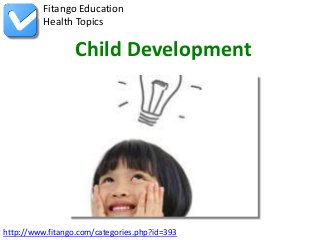
Child Development
- 1. Fitango Education Health Topics Child Development http://www.fitango.com/categories.php?id=393
- 2. Overview The early years of a child’s life are very important for his or her health and development. Healthy development means that children of all abilities, including those with special health care needs, are able to grow up where their social, emotional and educational needs are met. Having a safe and loving home and spending time with family?playing, singing, reading, and talking are very important. Proper nutrition, exercise, and rest also can make a big difference. 1
- 3. Monitoring and Screening Your child’s growth and development are kept track of through a partnership between you and your health professional. At each well-child visit the doctor looks for developmental delays or problems and talks with you about any concerns you might have. This is called developmental monitoring (or surveillance). Any problems noticed during developmental monitoring should be followed-up with developmental screening. 2
- 4. Monitoring and Screening Children with special health care needs should have developmental monitoring and screening just like those without special needs. Monitoring healthy development means paying attention not only to symptoms related to the child’s condition, but also to the child’s physical, mental, social, and emotional well-being. 3
- 5. Monitoring and Screening Well-child visits allow doctors and nurses to have regular contact with children to keep track of?or monitor? your child’s health and development through periodic developmental screening. Developmental screening is a short test to tell if a child is learning basic skills when he or she should, or if there are delays. Developmental screening can also be done by other professionals in health care, community, or school settings. 4
- 6. Monitoring and Screening The doctor might ask you some questions or talk and play with the child during an examination to see how he or she plays, learns, speaks, behaves, and moves. A delay in any of these areas could be a sign of a problem. The American Academy of Pediatrics recommends that all children be screened for developmental delays and disabilities during regular well-child doctor visits at: 5
- 7. Monitoring and Screening -- 9 months -- 18 months -- 24 or 30 months Additional screening might be needed if a child is at high risk for developmental problems due to preterm birth, low birth-weight, or other reasons. 6
- 8. Monitoring and Screening If your child’s doctor does not routinely check your child with this type of developmental screening test, you can ask that it be done. **Why It’s Important** 7
- 9. Monitoring and Screening Many children with developmental delays are not being identified as early as possible. As a result, these children must wait to get the help they need to do well in social and educational settings (for example, in school). 8
- 10. Monitoring and Screening In the United States, about 13% of children 3 to 17 years of age have a developmental or behavioral disability such as autism, intellectual disability (also known as mental retardation), and attention- deficit/hyperactivity disorder. In addition, many children have delays in language or other areas that can affect school readiness. However, fewer than half of children with developmental delays are identified before starting school, by which time significant delays already might have occurred and 9
- 11. Monitoring and Screening **Early Intervention Services** Research shows that early intervention treatment services can greatly improve a child’s development. Early intervention services help children from birth through 3 years of age (36 months) learn important skills. Services include therapy to help the child talk, walk, and interact with others. 10
- 12. Monitoring and Screening **Early Intervention Services** The Individuals with Disabilities Education Act (IDEA) says that children younger than 3 years of age (36 months) who are at risk of having developmental delays, might be eligible for early intervention treatment services even if the child has not received a formal diagnosis. These services are provided through an early intervention system in each state. 11
- 13. Monitoring and Screening **Early Intervention Services** In addition, treatment for particular symptoms, such as speech therapy for language delays, often does not require a formal diagnosis. Although early intervention is extremely important, intervention at any age can be helpful. 12
- 14. Developmental milestones Skills such as taking a first step, smiling for the first time, and waving "bye-bye" are called developmental milestones. Children reach milestones in how they play, learn, speak, behave, and move (for example, crawling and walking). 13
- 15. Developmental milestones Children develop at their own pace, so it's impossible to tell exactly when a child will learn a given skill. However, the developmental milestones give a general idea of the changes to expect as a child gets older. 14
- 16. Developmental milestones As a parent, you know your child best. If your child is not meeting the milestones for his or her age, or if you think there could be a problem with your child’s development, talk with your child’s doctor and share your concerns. Don’t wait. 15